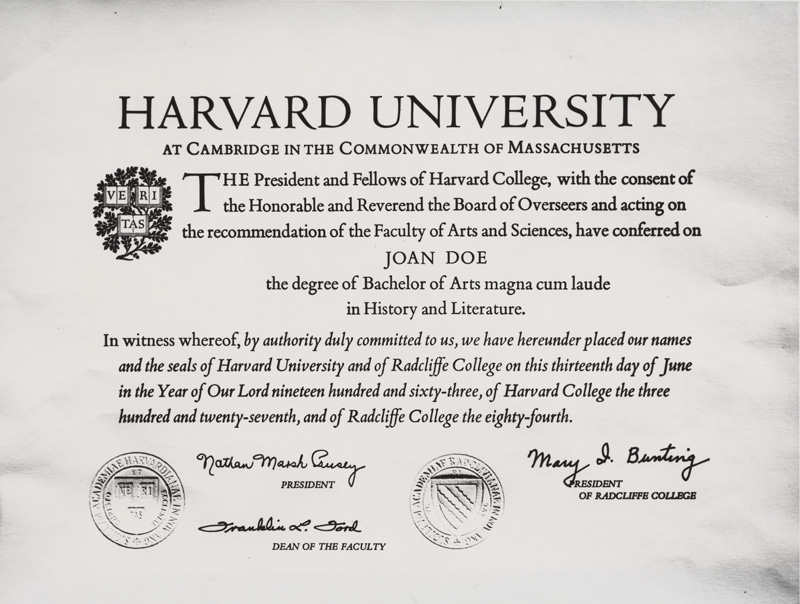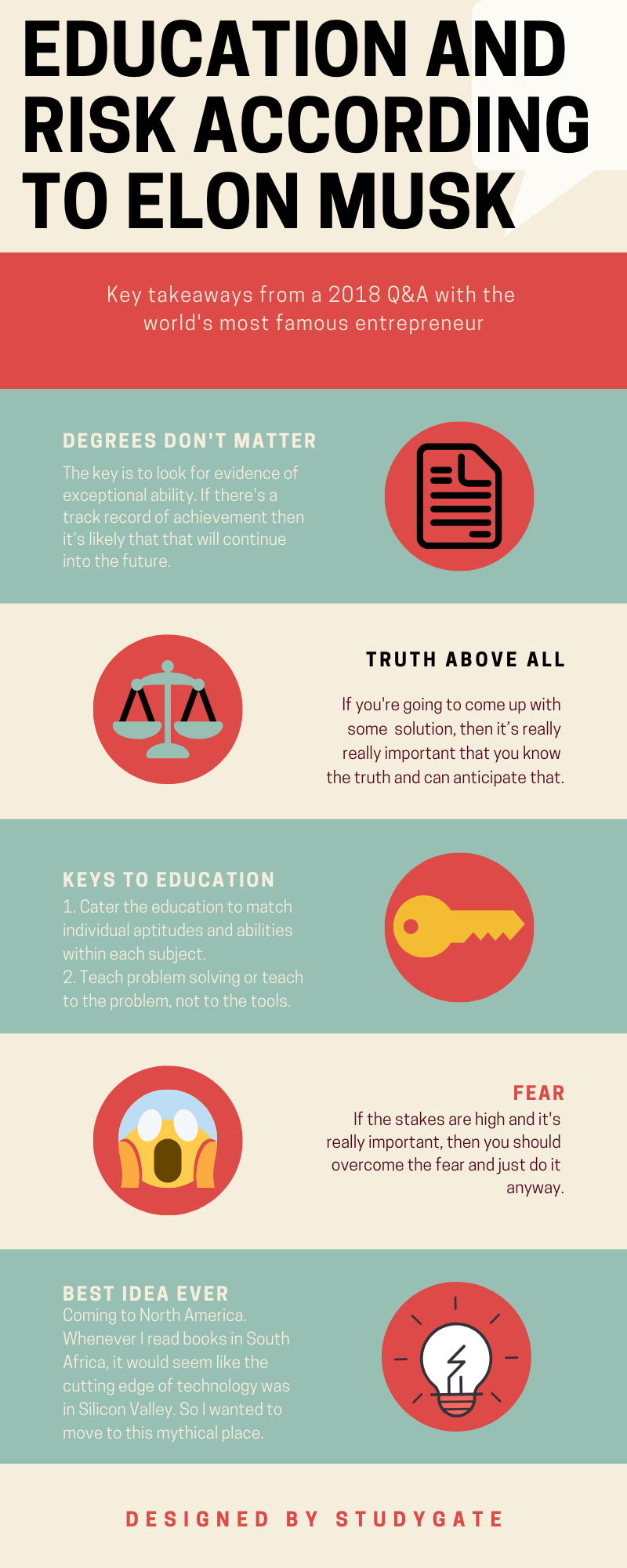Serial entrepreneur Elon Musk on education has some uncommon opinions. He is the founder of Tesla and SpaceX. Musk holds American, Canadian, and South African citizenship. He lives in Los Angeles, and he doesn’t give a damn about your degree. But he does care about your ability to teach yourself.
Share this Infographic On Your Site
Q: Elon, do I need a degree?
A: There’s no need even to have a college degree at all or even a high school diploma. If somebody graduated from a great university then maybe that’s an indication that they will be capable of great things but it’s not necessarily the case.
Bill Gates, Larry Ellison, and Steve Jobs didn’t graduate from college but if you had a chance to hire them that would be a great idea.
The key is to look for evidence of exceptional ability. If there’s a track record of achievement then it’s likely that that will continue into the future.
Q: Elon, how would you describe yourself?
A: I have a high innate drive and that’s been true even since I was a little kid. Back then, I did all sorts of risky things that I now realize were actually crazy. I care a lot about the truth of things and trying to understand why those things are true. If you’re going to come up with some solution, then it’s really really important that you know the truth and can anticipate that.
Sometimes I see things that seem quite clear and obvious to me, and I don’t understand why they aren’t so obvious to everyone.
Q: Elon, how do you educate your five boys?
A: I created Ad Astra which means “to the stars.” It’s different from most schools since there aren’t any grades at all. I’m making all the children go in the same subjects at the same time like an assembly line. This is because some people love English or languages, some people love math, and some people love music. It’s important to develop different abilities at different times and cater the education to match individual aptitudes and abilities within each subject.
I think it’s also important to teach problem solving or teach to the problem and not to the tools. So let’s say you are trying to teach people how engines work. You could start by the more traditional approach to teach all about screwdrivers and wrenches and even have a course on screwdrivers and wrenches.
But this is a very difficult way to do it. A much better way would be to show the engine and say “Let’s take it apart. How are we going to take it apart? Oh, you need a screwdriver. That’s what the screwdriver is for.” Then a very important thing happens. The relevance of the tools becomes apparent.
The regular schools just don’t do the things that I think should be done like the principles of focusing on one subject at a time and teaching directly to the problem. I actually hired a teacher from the school they were at who also agreed with me that there was a better way to do it.
The kids really love going to school, and I think that’s a good sign. I hated going to school when I was a kid. It was torture! So the fact that they actually think vacations are too long and they want to go back to school is a great sign.
Q: Elon, what do you have in common with Steve Jobs, Bill Gates, and Larry Ellison?
A: Those are pretty different personalities between Gates and Jobs and Ellison! All three of those were technologists but with different types of skills. Jobs was obviously very focused on aesthetics to integrate with the technology. He really answered the question of what people wanted even when they didn’t know themselves. Jobs was obviously not afraid to break boundaries.
Gates would probably be better at raw engineering and technology than Jobs, but not as good on aesthetics.
All of these guys were obviously very driven and they’re very talented and they’re able to attract great people to build a company.
The ability to attract and motivate great people is critical to the success of a company because the company is just that. It’s a group of people that are assembled to create a product or service. We all so often forget this elementary truth. So if you’re able to get great people to join the company and work together towards a common goal and you have a relentless sense of perfection about that goal, then you will end up with a great product.
If you have a great product, people will buy it and then you know you’ll be successful. It’s pretty straightforward.
Q: Elon, are you fearless?
A: I wouldn’t say I’m fearless. I feel fear quite strongly. If what we’re doing is something I think is important enough, then I just override the fear. But it’s not as if I don’t feel fear. I feel it stronger than I would like.
If the stakes are high and it’s really important, then I should overcome the fear and just do it anyway. It’s kind of annoying, I wish I felt it less.
Q: Elon, which venture that you founded would you say was the most risky at the start?
A: SpaceX. I thought it had the lowest chance of success. I thought both Tesla and SpaceX would fail at the beginning. What I thought was, “well, I’ll take half the money from PayPal and if I lose half of it that’s okay.” But then of course the companies encounter difficulties and then you have a choice.
1. Let the company die
2. Put all the money into the company
I really didn’t want the companies to die, so I put all the money into the company. Then I had to borrow money from friends to pay living expenses.
Q: Elon, what was your best idea ever?
A: Coming to North America was my best idea. I think these things would not have been accomplished anyway you know anywhere else. It’s really hard to start a company, but California and Silicon Valley is very conducive to startup companies. Whenever I read books in South Africa, it would seem like the cutting edge of technology was in Silicon Valley. So that’s where I wanted to come to move to this mythical place.
Q: Elon, are there things you regret having done or not having done so far?
A: There’s lots of things, but life is short. There’s lots of things that could be done that one can’t necessarily do. Overall, I think I’m pretty happy with where things are, it’s hard not to be. Things are in a good place right now.
I’d like to see humanity go beyond Earth and have people on Mars. That would be really great. I’d like to see widespread adoption of electric vehicles and renewable energy. These are great things and I think they would be really cool.
Watch the original interview here. Getting a job is hard. Here are some ways to decide if you should get a normal job or start the next SpaceX

